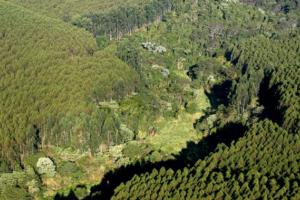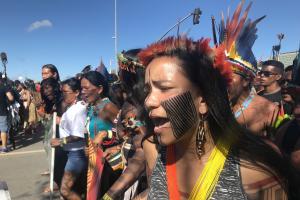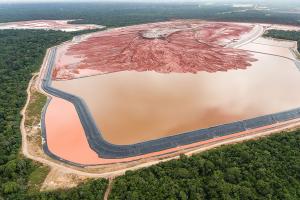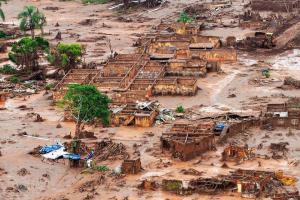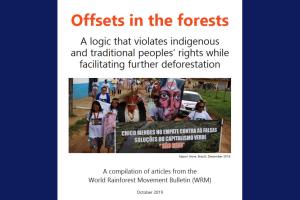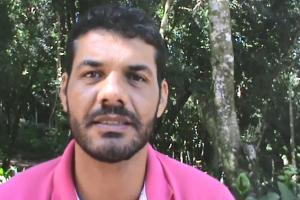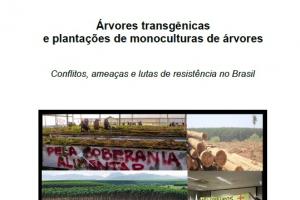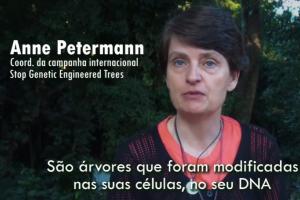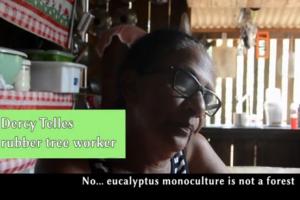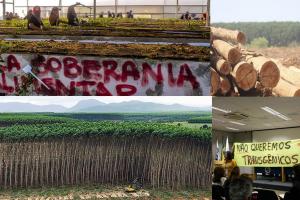A key tactic for the giant pulp producer, Suzano S.A, to keep expanding its industrial eucalyptus plantations in Brazil, is to market itself as a company that practices “conservation” and “restoration.” This conceals its disastrous track record related to forest and forest-dwelling populations.
Brazil
Bulletin articles
14 May 2020
Other information
13 May 2020
500 native trees and 500 fruit trees were planted at the Maila Sabrina camp, during the closing of the Training Course for Pedagogical Collectives of the Schools of the Landless Rural Workers Movement (MST) in Paraná. The action is part of the National Plan “Plant Trees, Produce Healthy Foods”, launched by the MST at the end of 2019, with the goal of planting 100 million trees throughout Brazil, over 10 years. The mystical and political act of planting trees denounced the perverse and destructive logic of agribusiness and the mining market.
Bulletin articles
13 January 2020
While it was easy to see the smoke from the forest fires in Brazil, it was much harder to see what was behind the Brazilian government’s smokescreen: actions that will lead the rainforest to a swift death, destroying territories, livelihoods and the diverse cultures.
Bulletin articles
25 November 2019
The growth of mineral extraction and metallurgical production, along with the consequent proliferation of toxic waste tailings dams, has occurred at the same rate as the emptying and bursting of tailings dams in several parts of the world.
Other information
25 November 2019
Four years after the collapse of Samarco’s tailings dam in Mariana, organizations and movements presented a case before the Inter-American Court of Human Rights. The objective is to condemn the Brazilian State for human rights violations that it committed throughout the Doce River basin, including violations of the rights to: life, due process and judicial protection, freedom of association, private and collective property, equality before the law and a decent life.
Publications
30 October 2019
A logic that violates indigenous and traditional peoples’ rights while facilitating further deforestation. A compilation of articles from the World Rainforest Movement Bulletin (WRM). October 2019
Multimedia
2 October 2019
Only available in Portuguese.
Publications
30 September 2019
Only available in Portuguese.
Multimedia
27 September 2019
Testimonies from the meeting "Threats and Impacts of Genetically Engineered Trees (GE-trees) Monoculture", that took place in Porto Alegre, Brazil, in April 2019.
Multimedia
27 September 2019
Anne Petermann, coordinator of the global Stop GE-Trees Campaign, explains what Genetically Engineered trees are, the risks, uncertainties and context.
Multimedia
27 September 2019
Video produced by Amigos da Terra Brasil and CIMI.
27 September 2019
A threat spreads across our territories. Under the misleading name of “reforestation”, which sounds quite nice, huge plantations of exotic – and even genetically engineered – trees have been set up in Brazil by transnational corporations. True “green deserts” lead to the extinction of countless species of our fauna and flora and changed the fundamental characteristics of our incredible natural and cultural landscapes, with clear social and environmental impacts, threatening the traditional ways of life of peoples and communities.
As the first country in Latin America to deregulate a genetically engineered tree (a eucalyptus species) and with a favorable political environment, Brazil has become a reference for transnational companies to carry out their projects. Precisely for this reason, the World Congress of IUFRO – International Union of Forest Research Organizations – will be held in Brazil, between September 29th and October 5th, in Curitiba, Paraná. We reject this corporate event, where false solutions and new ways to increase corporate profits will be discussed, at the expense of the commons.
